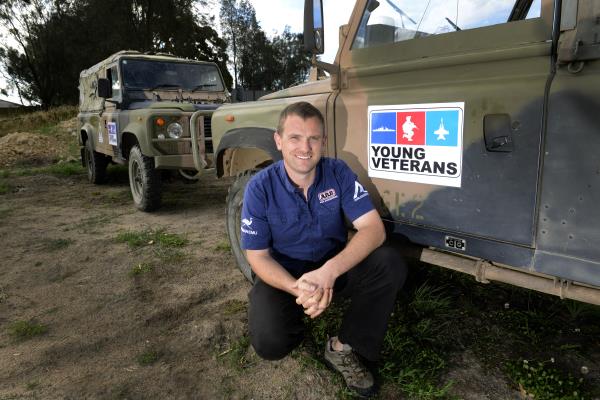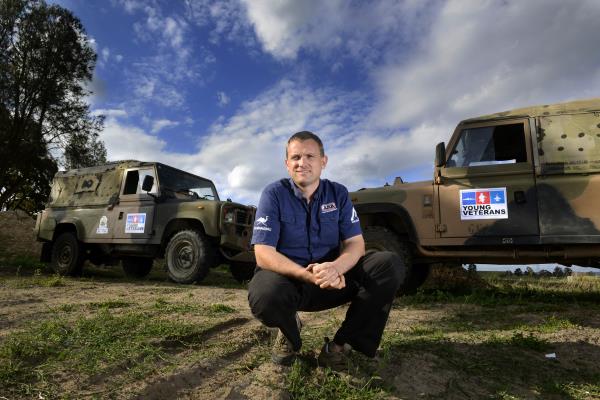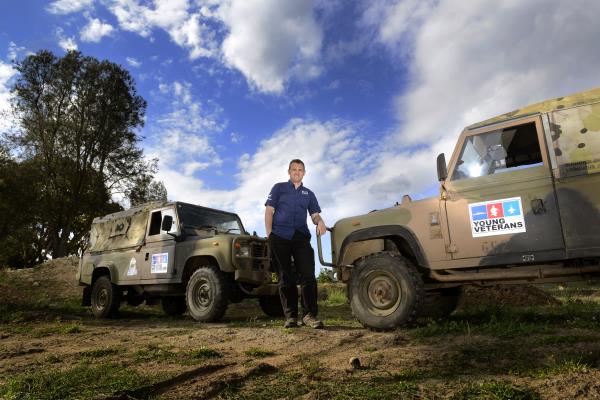
By CAM LUCADOU-WELLS
As the Anzac centenary approaches, a Pakenham ex-serviceman is heading a nationwide convoy for veterans – not for those who fought long ago, but the ranks of those in their twenties and thirties who invisibly suffer on their return. CAMERON LUCADOU-WELLS reports.
LANCE-Corporal Scott May is a veteran but not an old man.
Yet the Pakenham physiotherapist saw things in his two years deployed as an Australian Light Armoured Vehicle (ASLAV) crewman gunner in Afghanistan and Iraq that perhaps would change if not age a person.
10 July 2007 – in the Green Zone in Baghdad, Iraq. It was “just another job”, he writes. Sitting on the top of a parked ASLAV, chatting with colleagues – there was an explosion 100 metres away, and then another behind the wall they were next to.
They “closed down” behind the ASLAV’s protective armour and waited.
“When the barrage of 32 mortars subsided we could hear screams from outside. They were people screaming for help,” May writes.
“I opened up the vehicle and through the dust I could see two people on the footpath.
“My crew commander and I ran across the road to help the two wounded American soldiers.
“One had been hit in the leg and the other lay still on the footpath with a small blood stain on her stomach.
“Although we only met for the briefest of moments I will never forget her name – she left an everlasting impression on me and I wish we could have met in better circumstances.
“Captain Maria Ortiz passed away a short time later as a result of the wounds she received from a mortar exploding next to her as she crossed the road to begin her shift at the US military hospital where she was a nurse.”
Most of Australia’s returned ‘veterans’ are in their mid-twenties to thirties.
Some cope with the horrors of war, some struggle in silence. May says he struggled.
May and two fellow veterans – his brother Chris and colleague Sven Thomson – came up with an eye-catching idea to help their “brothers and sisters” reintegrate.
And to educate people of the “shattered” young veterans who live in our midst.
The trio are organising a Young Veterans convoy of three ex-military Land Rovers that will drive from the Australian mainland’s southernmost point at Wilson’s Promontory over the High Country to Cooktown, the northernmost tip of Queensland early next year.
May hopes the vehicles might catch their eyes, and inspire more young veterans to band together with those who understand.
“I’ve had my struggles. One of the ways I coped was to go out to the bush.”
Dandenong RSL enthusiastically donated the three vehicles, food and fuel. Like other RSLs, it is looking for ways to engage young veterans – in counselling or to band them together socially.
“We looked at starting up another ex-service organisation but there didn’t seem to be any point in reinventing the wheel,” May said.
“We want to show the RSL can provide more than cheap beer and two-up on Anzac Day.”
May says the notion of bush-bashing, four-wheel-driving, fishing and camping has appeal to ex-army veterans.
The notion grew from May’s own love of four-wheel-driving as a kid. That love of the outdoors and adventure probably propelled him and brother Chris – and many others – into the armed services.
They have come from all parts of the state to take part in action-packed Young Veterans weekend camping trips this year. The network grew through Facebook contacts.
Camping out gives veterans a chance to share their experiences, talk about life or “talk rubbish” with like-minded veterans. The main thing is the camaraderie, May says.
The alternative is to suffer in silence.
When May returned from his first deployment in Iraq, he found he got irritated by people sweating over the small stuff, couldn’t relate with others and hated crowds.
After an extreme, sleep-deprived life in 40-degree heat, he was annoyed by menial “news” such as reality TV’s Big Brother or the antics of the latest drunken footballer.
After three months, he volunteered for an Afghanistan reconstruction mission because he couldn’t cope at home.
When that deployment was done, he discharged himself, suffering depression and fatigue.
He felt a gulf between himself and his wife and his workmates. “They didn’t get it,” he says.
At work, he didn’t “get” how colleagues tried to avoid finishing a task – as opposed to the “get-it-done” approach instilled in him by his training.
May knows many friends killed overseas and those forever altered by lost limbs, eyesight and hearing.
But there are many more without physical injuries who invisibly battle post traumatic stress disorder and adjusting to civilian life.
He tells of friends who became uncontactable, just “dropped off the grid” to find themselves. Too many of them have suicided on their return, he says.
“We just want to reach out to young guys, for them to seek further assistance.
“We all have struggled. We all have issues and know what it’s like.”
If you can help or sponsor the Young Veterans rally, email Scott May on scott.may2@live.com.au









